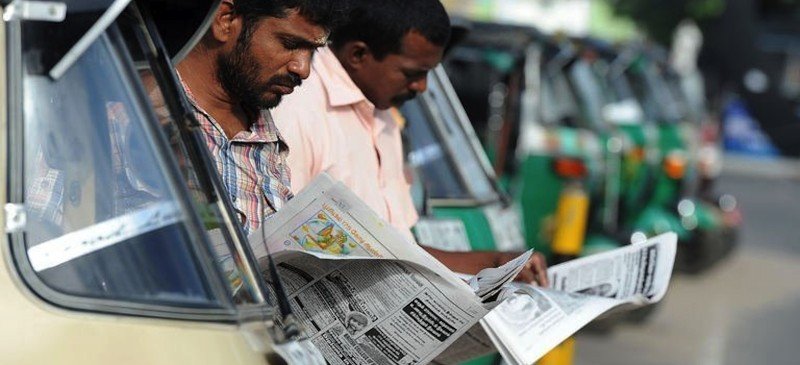 |
| Jaffna after elections; AFP photo |
Kalana Senaratne
The TNA has swept the polls in the North. More importantly, the Tamil people have voted courageously, convincingly, and clearly. It was an expected outcome, but as President Rajapaksa took off to New York, he would have known that numbers and statistics on paper, more than just mind-made presumptions, can have a very coruscating impact, that the numbers in this case do not lie; not in the ‘South’, and never in the ‘North’.
The election to the Northern Provincial Council (NPC) was not just a provincial election. It was that, and much more than that. It was almost like a referendum; not for a separate State, for the TNA Manifesto did not demand a separate Tamil Eelam State, in any explicit manner. But it was certainly a referendum of sorts, calling for the recognition of the right to self-determination of the Tamil people, for greater autonomy, for a re-structuring of the existing constitutional framework, and for accountability.
Lessons about the Conflict
The result in the North tells much about the ethnic problem in Sri Lanka.
Firstly, it tells us that the problem here is not just a problem of discrimination, or about the need for a more Tamil-friendly government in the ‘South’, or the absence of economic development. It is also not so much about the need to devolve a few powers to the periphery so that the people in those areas could benefit from them; a theory which was in any case rubbished when a Colombo-based Mr. CV Wigneswaran was nominated as TNA’s Chief Ministerial candidate. This is not a conflict that can be resolved only by enacting a new bill of rights, or by establishing more independent institutions.
Rather, the problem is more about nationalism and nationhood, about the Tamil people’s aspirations, about their need to be recognized as an equal nationality on the basis of equality and self-determination. It is a question that has to do with a deeply polarized polity, or deeply polarized polities. In broader terms, it is a question about how peoples with contrasting views about their nationhood, about their histories, can still co-exist peacefully.
Secondly, another related point that this election drives home, and one which should be openly acknowledged, is that whatever the historical facts one may adduce for or against the ‘traditional homeland’ argument of the Tamil people, the verdict of the Tamil people shows that for all practical purposes, the North, at least, is an entity which the Tamil people can consider to be their ‘traditional homeland’. There’s another phrase for that (which the TNA uses, as well as the Indo-Lanka Accord): ‘historical habitation’. Of course, these are vague and wooly, and contestable, terms; but not so for political purposes, not when one part of the country votes in a clearly recognizable and distinctive manner. Interestingly, with the holding of the NPC election, what the Sri Lankan government has ended up doing (unwittingly) is to further politically strengthen the Tamil nationalists’ claim for a ‘traditional homeland’. So you may spend your whole life seeking historical arguments to demolish such territorial claims, but the brutal and agonizing reality is that such claims get validated, strengthened, solidified in numerous different ways; especially with election-results like this. This then appears to be a clear win for the Tamil nationalists.
Thirdly, the Tamil people have also shown quite convincingly that infrastructure development and the construction of hotels are not enough, that the ‘Uthuru Vasanthaya’ kind of narrative means nothing much to them. And in Kayts, they have dealt an important and necessary blow to the EPDP which continues to carry out its armed activities. In a sense, the Tamil people have done their utmost to ensure that the government and its allies are not afforded too much legitimacy. That poses a significant challenge to the government, a challenge that no community in the ‘South’ has been able to pose.
Victory-Defeat
But there is also a more serious dimension to note. A careful examination suggests that much of the above was precisely what the Sinhala nationalists feared might happen.
One: so for example, while the Sinhala nationalists often claim that the problem in Sri Lanka is not a problem of discrimination, they are not wholly incorrect in stating that the problem here is largely a problem of Tamil nationalism too (as often stated by the likes of Prof Nalin de Silva). This election strengthens the point, given the nationalist rhetoric of the TNA. Now that the Sri Lankan government has missed the plot, the Sinhala nationalists could begin to wonder whether President Rajapaksa has been too lenient, even careless, about holding the NPC election. And the Sinhala nationalists would well be thinking that they might have got their Rajapaksas mixed up.
Two: it will be seen from the above that it is not incorrect to argue, as Prof GH (‘Gerry’) Peiris pointed out more recently, that the Indo-Lanka Accord (and indeed the 13th Amendment) recognized the ‘traditional homeland’ claim of the Tamil nationalists. That the Indo-Lanka Accord goes some distance in acknowledging such a claim, has been pointed out by many analysts. And more importantly, for all practical purposes, this recognition comes about largely through elections, and once a people have voted in a clear and convincing manner in favour of a manifesto promoting the demand for self-determination and autonomy, especially at provincial/regional elections which are specifically focused on promoting self-government to that contested province.
One question of course is why the LTTE failed to support the Indo-Lanka Accord and the 13th Amendment. That was perhaps a case of the LTTE being too impatient, lacking in political imagination, and unable to make crafty use of the language of the Indo-Lanka Accord (or the 13th Amendment framework). In other words, it is not that the Indo-Lanka Accord does not recognize a Tamil homeland; rather, it is just that the LTTE could not read the Accord in a way that promoted their project.
And here’s the danger. The TNA is now in a position to go in any direction it wants to go: it can take a very ‘separatist’ path (and read all these documents in a way promoting separatism), or a path promoting greater unity. The danger is that the moment they adopt the former path, the prognostications of the Sinhala nationalists come true. In short, the current situation calls for a lot of patience, for just a slight slip on the part of the Tamil nationalists would validate the entire narrative of the Sinhala nationalists (that is if, according to some, this hasn’t happened already).
Three: and finally, it is also not incorrect to argue (as Mr. SL Gunasekera did) that the 13th Amendment was not about devolving powers to the people of the North (given Mr. Wigneswaran’s nomination). Rather, for certain sections within the TNA, it was about having a person who is more comfortable with the language of international diplomacy, someone who could be a voice that the ‘international community’ couldn’t ignore. And the moment Mr. Wigneswaran trips and adopts a discourse which he perceives would please the external forces, the Sinhala nationalists would be proven correct.
Viewed from this angle, then, what emerges now is a highly tensed situation. And what the above reflect is very simply this: that every victory for the Tamil nationalists seems to validate the perennial fears of the Sinhala nationalists, while every victory for the Sinhala nationalists in turn validates the fears of the Tamil nationalists. If then, both communities need to rethink what May 2009 and September 2013 mean to them respectively; for all victories mean a defeat to someone else, all defeats a victory to another.
What can be done?
With great victories come great responsibilities too. On the one hand, it would be well if the Tamil nationalists, while continuing to make their political claim for self-determination (with the intention of exercising it within a united Sri Lanka), also promote a discourse which places equal importance on the greater democratization of the rest of the country. That is essential. And the Tamil people will not lose anything by attempting to convince the Sinhala people that they (the Tamil people) are for a united Sri Lanka.
Of course, this cannot be done by simply walking together or holding hands with the Opposition parties; it is also not easy with political manifestos which sound more like written submissions prepared for a case before the International Court of Justice! Rather, the TNA and other Tamil parties would need to articulate more fully and comprehensively, even carefully, their political, cultural and also economic aspirations and plans and how these could also benefit the construction of a united Sri Lanka. It is also necessary for them to construct a more distinct Tamil-Hindu Sri Lankan identity that is vibrant and strong enough to withstand unnecessary intrusions from Tamil Nadu and the West.
On the other hand, however, it is necessary for the Sinhala community to take a serious and cold look at the election results, at the polarization that has taken place, and question whether more LTTE-bashing takes them anywhere. They will need to understand that the Tamil people are not terrorists, and that attaching the ‘terrorist’ label on the TNA is similar to attaching such a label on the Tamil people too. And to be sure, it is also necessary to shed this idea that somehow the Tamil politicians have misled the Tamil people. Nothing of that sort has happened unless one imagines the Tamil people to be a fools; and the politician-people dichotomy is largely a myth.
But doing all this doesn’t mean that the problem confronting us will be resolved. That too is a fat illusion. Yet, some progress can be made in moving towards a place that is far better than the present.
Conclusion
For the moment, however, there is only a question: why then do we need to welcome this result, this victory of the Tamil people? It is because that despite all the dangers and uncertainties that hover over us, the Tamil people of Sri Lanka have given a clear verdict. It is because the Tamil people, after long years of suffering, have stood resolutely, together, in exercising their franchise. It is a result to be welcomed for all those reasons, but also for showing those of the younger generation the sheer complexity of the problem at hand. It is a result to be welcomed precisely because it wakes us from our slumber, because it tells us that not everything is well, up there in the North. It is to be welcomed because it reminds us of what true reconciliation ought to be, that it is not about giving a hand to those who come crawling towards you, but about unconditionally accepting the other as your equal: one might be inclined to praise Prabhakaran, and yet, we are equals for we too have had that mad rage within us; one might talk incessantly about a homeland, but in denying it we too had believed in our own version of a homeland – so here’s a hand. And this verdict is to be welcomed because at a time when most political movements are turning into political dinosaurs, the Tamil people might just have taught them a few lessons on struggle, courage and resilience. For some Sinhalese like us to whom the Tamils are our equals, this is our victory too; a victory of, and ultimately for, the commons. There is much work to be done now, together
GV
